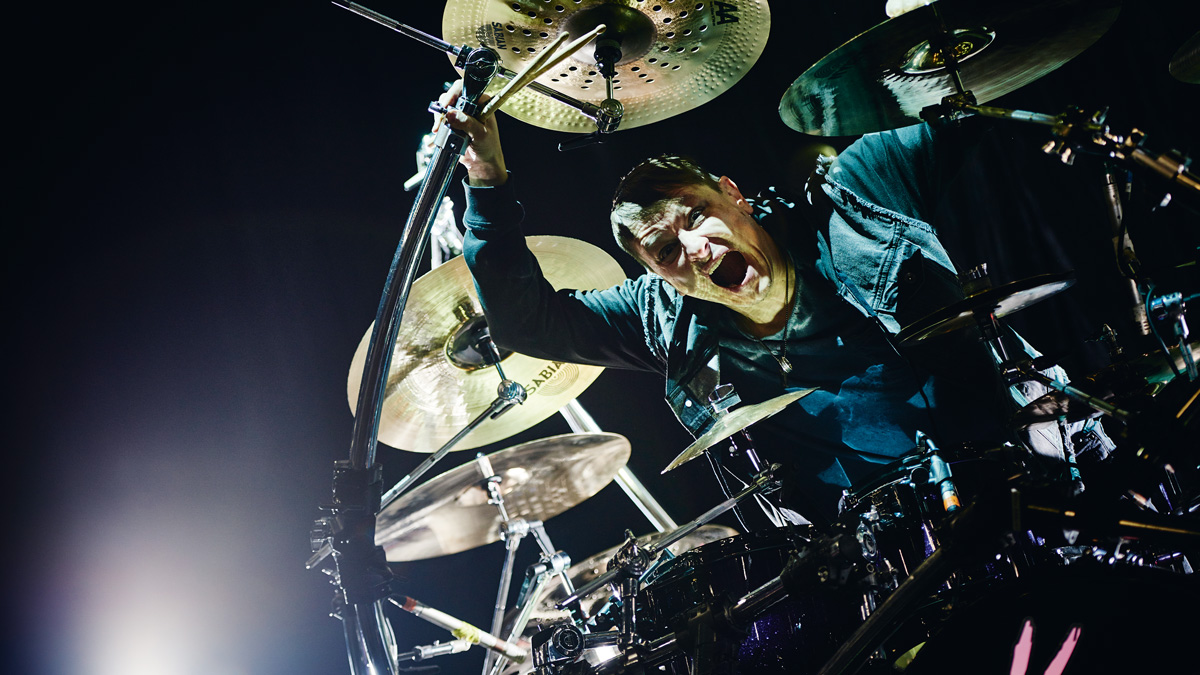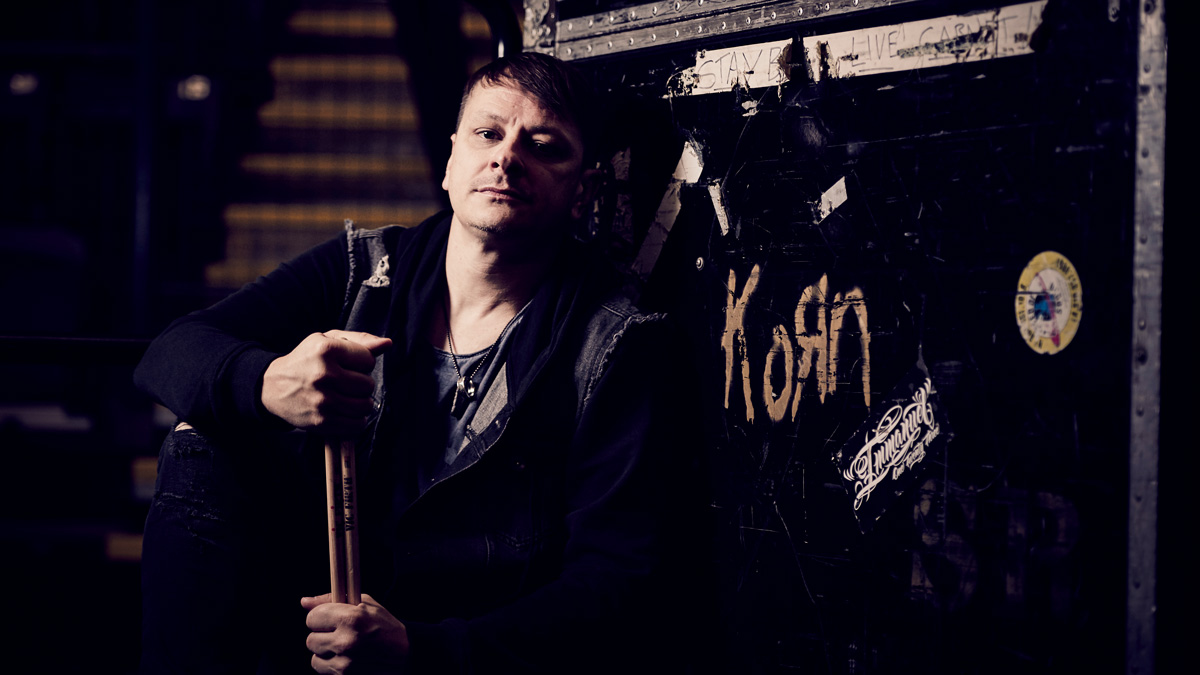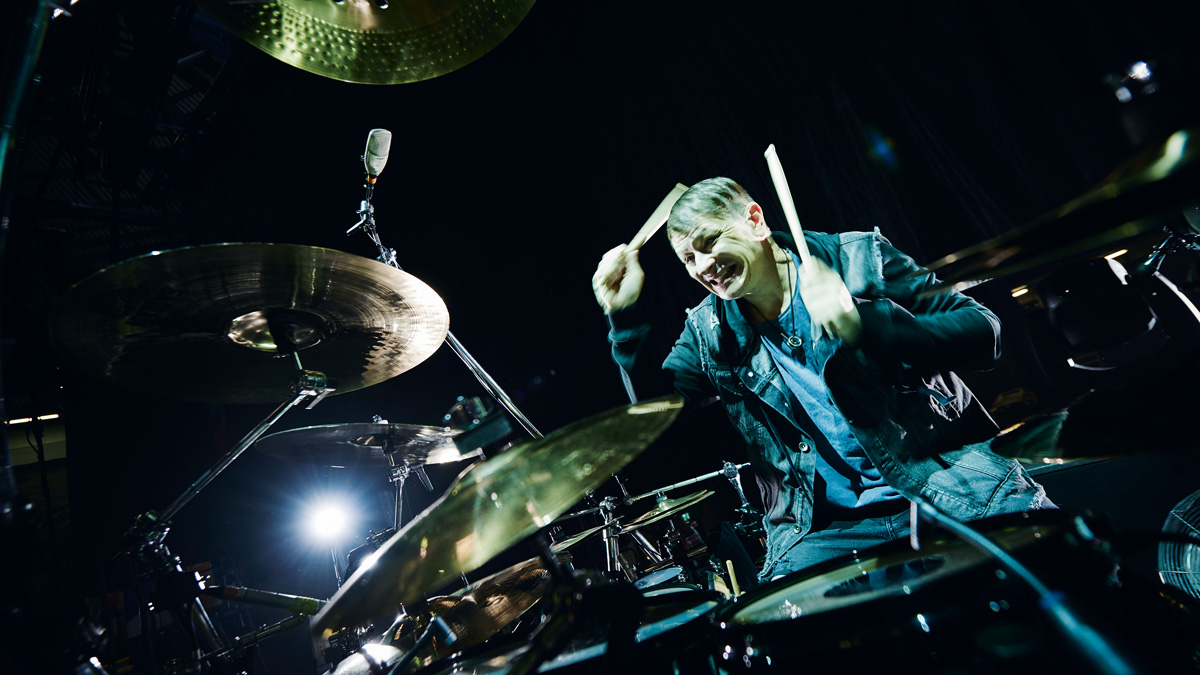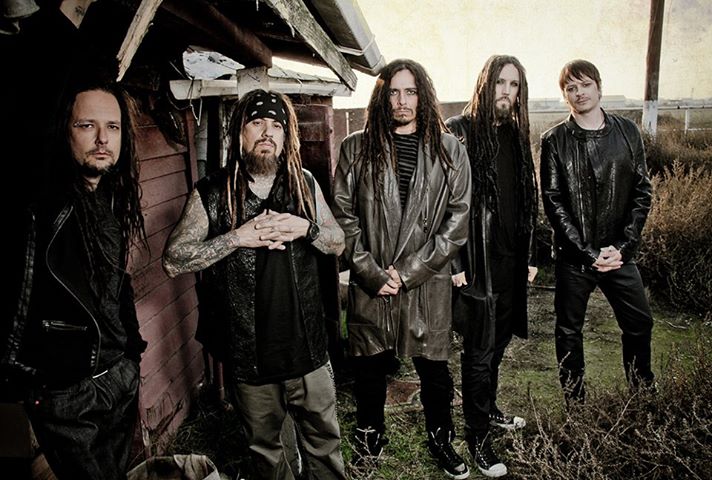Ray Luzier talks sold-out tours, hit albums and the secret to killing it onstage with Korn and KXM
"We will go until we can’t go any more..."

"There’s no drama any more. Now it’s all about the music ..."
When nu metal exploded back in the ‘90s, it was easy to dismiss the genre as a passing fad.
Korn were one of movement’s pioneers and 24 years on from their inception they’re not only still around, but they’re kicking some serious arse.
Their latest album The Serenity Of Suffering takes the band back to their gritty, metal roots and is without doubt their finest for more than a decade. Not just that, but they closed 2016 with a sold-out arena tour with Limp Bizkit.
For the last ten of those 24 years, Ray Luzier has been behind the Korn kit. Since taking over from original sticksman David Silveria in 2007, former David Lee Roth drummer Luzier has well and truly made the position his own. That extends from everything from his groove-drenched, ambidextrous playing to his distinctive set-up with the ever-present Holy China smack bang in the middle of his cymbal rig. He’s also still playing 90-minute-plus Korn sets with incredible aggression and intensity night after night, an impressive feat for a guy now well into his mid forties.
“I thought I’d be bald, fat and playing in a jazz club hitting the drums lightly with a cigar hanging out of my mouth [laughs],” says the 46-year-old Pittsburgh-native.
We sat down with Luzier and discovered just how Korn are still going strong almost a quarter of a century in.
You recently toured with Limp Bizkit - that’s a tour that many people thought they’d never see.
“Korn and Bizkit haven’t played together for a while. The turn-outs here have been better than we expected. Fred [Durst] came over on the first day and seeing him and Jonathan [Davies] hug was great. Fieldy was one of the first people to go to management in the early days and say Bizkit were going to be big and they needed to take them on. Today, we’re all so happy to just be still doing this. There’s no drama any more. Now it’s all about the music and our families. That’s a wonderful thing. Back in the day there were all kinds of substances in the way, there was all this unnecessary drama. I myself didn’t think I’d still be touring in my forties. I thought I’d be teaching or something but to be 46 and still touring and alive and well is great.”
I thought I’d be bald, fat and playing in a jazz club hitting the drums lightly with a cigar hanging out of my mouth.
This is a punishing gig for a 46 year old.
“People like Tommy Aldridge and Billy Sheehan, they’re in their 60s and still doing it. Billy called me a while ago and he’s still so high on touring and so into it, it’s really inspiring to hear. Korn is a very aggressive band, I don’t tap. I hate seeing aggressive bands with a drummer that hits lightly. When I’m onstage the music takes over, it’s like an out of body experience. When the lights drop this feeling comes over me. Every time we will say as a band that we should lay back a little on this tour but the music just takes over. I always think about what I would want to see if I were in the audience, I wouldn’t want to see some boring dude back there with a face like he’s waiting for the bus. I’d want a show.”
Don't Miss
Exclusive! Ray Luzier of Korn drum cam: Rotting In Vain
Korn's Ray Luzier on recording new album The Serenity of Suffering

Going 'till they drop
Does touring take more of a toll on you as you get older?
“It does take a toll. Knock on everything I’ve never really had a hand problem or anything like that. I studied proper technique back in the day. It looks like I’m killing everything but my grip is very loose, I’m barely holding the sticks. I think that helps me to be able to hit as hard as I do. Guys that grip tightly tend to have hand problems. I have students in their twenties that have carpal tunnel.”
Do you need to stay healthy while on the road?
“I try to eat right. My wife is amazing, she eats really well so when I’m home I eat a lot better. It’s hard when I’m out on the road. I’ve never smoked, I’ve never done a drug in my life but I do like red wine. I try to eat well, I try to eat salads but I always end up having them with a big bowl of ice cream. I try to stretch a lot. Stretching is as physical as I get. If I don’t stretch I will really hurt the next day. I don’t work out at the gym, I have enough of a workout on stage and then I go walk around whatever town we’re in that day.”
I try to stretch a lot. Stretching is as physical as I get. If I don’t stretch I will really hurt the next day.
Not only is Korn a physically demanding gig, but you guys don’t seem to take much time off. Can you see yourself being able to sustain this into your fifties?
“Me and Jon were talking about this. Jon did an interview where he was asked when he saw himself stopping. He said he didn’t see that happening and he wanted to drop on stage one day. That’d be the ultimate way to go out. At this point there’s nothing else we want or care to do. We will go until we can’t go anymore, we’ll go until the fans stop showing up.”
There doesn’t seem to be much danger of that…
“We still get the occasional person that’s like, ‘You guys are still around? I stopped listening to you in 1999’. But then we have fans that just got into us on the new album. It’s the whole spectrum.”

Taming the beast
Serenity Of Suffering has an old-school Korn sound. It nods back to some of the albums that pre-date your time in the band, so was this record challenging for you?
“Me and Head are the metalheads of this band. We’re the ones writing the heavier stuff. We all like different styles in this band. We started writing for the album and me and Head both live in Nashville and we’d meet up and Munky would come down or we’d fly to LA and we’d write in a small rehearsal room. We had all of these songs and it was time to bring a producer and I’ve been a fan of Nick Raskulinecz for a long time. He has a way of making a band feel like they’re supposed to feel. He told us he was a big fan but for the last several records we were missing a feel that Korn initially had. I’ll be damned, but he got that feel out of us.”
We hear he was very hands-on with your kit.
“He tamed my drum parts. I’d play a crazy fill and he’d stop me and tell me to think of the song. On Rotting In Vain there’s a fill after the second chorus and the first time it was this really complex over-the-barline chop thing. Nick liked the fill but he wanted me to stop playing for drummers. He really made me think.”
This album again shows how unique Korn are. You’ve got Fieldy’s huge bass tone and the back and forth guitar effects of Munky and Head. With all that going on is it difficult to find your own pockets of space?
“It took me years to get my identity in this band. I was a session guy for many years. I had to be a chameleon and learn real quick. I’d say, ‘Hi, my name’s Ray,’ and five minutes later the red light’s on and you’re recording. I’m used to that, but Korn is its own animal.
“I’m in my tenth year now with Korn. When I was a hired gun at the end of 2007 I was fine with that. I had already played with guys like David Lee Roth and I’d had to play Alex Van Halen’s drum parts. Going to Korn was a different animal, they have their own sound and individuality. There’s a reason why the first few records with the five original members did so well.
“When I joined the band Jonathan, who is a drummer himself, said to me that I could pay homage to what David had done but they wanted Ray Luzier in the band. They wanted my personality because they liked my playing. I was flattered by that but if you change too many of the parts you get fans saying you’re overplaying.
“When that happens I want to yell out, ‘But the singer told me I could!’ But then if you copy the original drummer verbatim on the old stuff it’s like you’re trying to just play like him. It’s a weird place to be in. Then if I didn’t do it someone else would be doing it and they’d be getting the same s*** that I got.
“It was real challenging in the first few years before I found my niche. We play off each other now. I’ll play something and Fieldy will start playing off it. We vibe off each other. We’re all open, there’s no ego crap.”
I remember telling my parents that if I could get a solid year of touring with Korn it would look great on my resume because they’re such a unique band. When the second year went by I was thinking, ‘Okay, I’m still getting pay cheques, this is weird’
You couldn’t have had any clue that you’d still be in the band ten years on.
“I remember telling my parents that if I could get a solid year of touring with Korn it would look great on my resume because they’re such a unique band. When the second year went by I was thinking, ‘Okay, I’m still getting pay cheques, this is weird.’
“In 2009, they said they didn’t want me to go anywhere and they wanted to make me a member. Fieldy wanted me to go to meet and greets and I was like, ‘People don’t want to meet me!’ I would show up to the first meet and greets and people would be like, ‘Jon, your lyrics saved my life, Fieldy your bass is incredible, Munky, I love you,’ then they’d turn to me and say, ‘Who the hell are you?’ To them I was some new drummer; they didn’t know I had 50 records under my belt.”
You wanted to stay, but the band must have been concerned that you’d want to go back to session life.
“On the first tour we did 35 countries in four and a half months. They took four months off and I called the manager and asked if I could book some drum clinics. He said I could do what I wanted but just don’t join a national band. He said not to do any big tours because Korn wanted to play with me more.”

Side projects and experimentation
How has your role changed in the past 10 years - are you more hands-on in the writing process?
“From the get-go they were open to my ideas but now even more so. But then a song like Never Never has been a big single for us in the States and that’s one that Jon brought in pretty much completed and we just put our stamp on it but that was an exception.”
On record Korn has always been about progression. Has that helped the band sustain a 24-year career?
“I spoke with the guys in Disturbed about this because they went away for four years and that was smart because they’ve came back right on top. Everyone tells us to take two years off but we keep going.
“Also, we’re not like AC/DC or Iron Maiden where you know what you’re going to get with every record, and that’s totally fine because they’re both great bands. But with Korn we love to go left of centre. Sometimes that pisses some fans off but then we gain new fans as well.
“Look at the Path Of Totality record. Jon really felt strongly about making an EDM record. That was real left-field, it even took me a while to wrap around my head around it. I love that we don’t release Life Is Peachy every other year. Korn could make a country record and it would still sound like Korn and that’s a beautiful thing. It’s cool to be experimental.”
You do have a few weeks off coming up, will you keep busy behind the kit in the downtime?
“I have a band called KXM and we have a new record coming. That’s with George Lynch and Doug Pinnick. We just finished mixing the record and it is a great creative outlet for me. I have a home studio now with three drum kits set up all miked up. I can send tracks to anyone anywhere in the world within seconds, it’s a beautiful thing to have.
“When I’m at home, though, because I feel guilty for being on the road so much, I glue myself to my family. That means my sessions are pretty seldom. If I’m playing drums and look at the window seeing my son kicking a ball around I’ll throw the sticks down and go play with him, so I don’t do too many sessions.”
Will you have time to promote the new KXM album?
“With KXM the first record sold over 50,000 copies from zero shows and promotion so we’ve made a second one. We’re going to try and play some shows. We get all these offers to play rock cruises and things like that. If time allows in 2017, we might do some shows. My goal is to play a couple of weeks somewhere and film a DVD so the fans can at least have that.”
Korn's current album The Serenity Of Suffering and KXM's latest release, Scatterbrain are both out now. Korn play the Reading & Leeds Festivals on Sat 26 August (Reading) and Sun 27 August (Leeds).
Don't Miss
Exclusive! Ray Luzier of Korn drum cam: Rotting In Vain
Korn's Ray Luzier on recording new album The Serenity of Suffering
Rich is a teacher, one time Rhythm staff writer and experienced freelance journalist who has interviewed countless revered musicians, engineers, producers and stars for the our world-leading music making portfolio, including such titles as Rhythm, Total Guitar, Guitarist, Guitar World, and MusicRadar. His victims include such luminaries as Ice T, Mark Guilani and Jamie Oliver (the drumming one).
